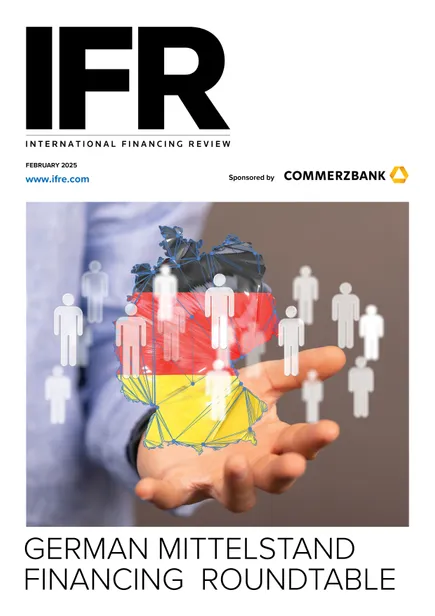IFR German Mittelstand Financing Roundtable 2025

IFR’s German Mittelstand video call – which took place in early December – found the panel of bankers from Commerzbank, DZ Bank, ING and LBBW in cautiously optimistic mood despite the potentially destabilising factors swirling around the market.
From a volume perspective, German syndicated loans looked resilient in 2024 following two years of declining activity. While this came as no surprise, activity was driven by routine multinational and large company jumbo refinancings rather than activity by German mid-caps to fund M&A or investment. The number of transactions below €1bn declined.
While bankers were content that the bank market was able to continue functioning smoothly and it was clear that banks’ preparedness to lend remained intact, there was also some disappointment that investment and consolidation remains on hold, particularly as pricing pressure was seen less on mid-cap deals than deals in the large company segment.
German mid-cap deal pricing continued to be as much of an art as a science. The lending community in the German mid-cap segment has reportedly seen a number of exits by international banks and remaining participants are a fairly discrete group. Depending on the deal and whether new banks chose to join or existing banks chose to refrain, mid-cap loan pricing exhibited some divergence, although pricing also depended on the relationship cross-sell.
The loan bankers on the IFR call were steadfast in their contention that the classic non-sponsor-driven, non-special situation, corporate mid-cap segment in Germany continues to be devoid of private credit involvement because the returns are too low.
The Schuldschein market saw a decline in volume last year as deals above €1bn failed to materialise. That was driven mainly by lack of demand from issuers for drawn funds. At the same time, there was more lender and investor caution as certain companies that had issued Schuldscheine initiated restructuring programmes.
On that front, Germany saw some activity as well as situations that required covenant amendments or waivers but they tended to be sector-specific. Banks exercised caution in certain regards, however, and pricing reflected that while discussions with internal risk and credit departments were lengthier than in previous years. The theme of dealing with companies entering difficulties and needing help with their debt is expected to persist in 2025.
Bankers on the call had mixed feelings about 2025’s prospects for M&A and investment activity by German mid-caps but they are looking forward to an uptick in infrastructure and energy financing, as well as transition financing.
Demand for labelled green and ESG loan financings has evaporated as companies and bankers have come to the conclusion that the amount of work required on both sides to get deals done is not worth the effort, given that regulatory and other standards make it clear which companies pass muster on the sustainable front.
Asked to score their general level of optimism for the coming year on a scale on one to 10, the participants on the call scored themselves with an optimistic average of eight.
To see the digital version of this report, please click here.
To purchase printed copies or a PDF of this report, please email leonie.welss@lseg.com






